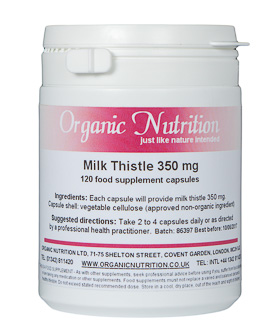Milk Thistle and its historic uses

(zero additives, flavours or binders etc.)
The humble milk thistle has been cultivated for many centuries. As with many plants that are found on wasteland or in hedge rows or bank sides, it is often considered a weed and sadly not often cultivated in our modern gardens.
But in the past, many cottage gardens or grand houses would have grown Milk Thistle as a food source as well as for health uses.
It has a rather beautiful flower
The heads of purple flowers would have been seen frequently in our gardens. It comes from the Compoistae Family of plants, which is the same family as the Artichoke. The milk thistle plant itself is very edible. The flower head can be cooked and eaten like the artichoke.
In the eighteenth century the young shoots were thought to be better than the best cabbage. The young leaves can be added to a salad, the stalks and roots are also edible either cooked or raw.
Some traditional benefits
As for the health benefits of this humble plant: Nicholas Culpeper, the 17th Century English botanist and herbalist, considered milk thistle to be an efficient assist in the treatment of fevers, including shivering or shaking chills, accompanied by malaise, and pains in the bones and joints. Some historical records suggest it was sometimes used in the prevention and curing of the plague.
Perhaps its most common use over the centuries was for the removal of waste and some obstructions of the liver and spleen. He also recommended the young tender plant (after removal of prickles) to be boiled and eaten in the spring as a blood cleanser.
More ancient records and uses
The ancient philosophers Pliny and Galen both also praised the Milk Thistle for its liver cleansing properties. Today Milk thistle is one of the most widely used and most well researched plants in cleansing and strengthening of the Liver.
It is often sold as a Detoxing and Cleansing herb. One of the active ingredients in milk thistle is known as "silymarin". This plant is very rich in this chemical. Silymarin has many actions.
Silymarin - One of the natural chemicals
Silymarian seems to encourage liver growth on a cellular level. One result of this cellular grow is the changing of the outside layer of cells and thereby preventing the binding of toxins to the liver. It stimulates protein synthesis thereby seemingly "repairing" the liver cells which have been damaged by toxins and alcohol.
It is also an antioxidant and so it reduces free radical production. Antioxidants are thought to protect body cells from damage caused by a chemical process called oxidation. Silymarin also increases bile solubility thus helping to prevent or ease gallstones and can help reduce inflammation.
Blood Cleanser
Milk Thistle has shown to be a superb blood cleanser. Another traditional use of Milk Thistle has been in treatment of lactation- breastfeeding. Although this was traditional used in lactation because of the white veination on the leave, modern research has found Milk thistle has some oestrogen-like effects.
This may stimulate the flow of breast milk in women who are breast-feeding infants. It may also be used to start late menstrual periods. Milk thistle seed extract is known to have estrogenic effects and effects on memory by estrogen have been reported.
The whole herb is of value in the stimulation of appetite and to assist digestion. It has been used as a remedy for over 2000 years. It has a history of usage in the Middle East and Europe, and extends back to Roman and Greek usage.
Interestingly, milk thistle seed has historically been given to people that ingested amanita, a toxic mushroom. It appears science agrees with this folk remedy, as researchers at the Institute of Complementary Medicine at University Hospital Zurich in Switzerland reviewed 65 papers on milk thistle trials and studies and, based on the available evidence, concluded it was reasonable to use silymarin for amanita toxicity. A review of all information also prompted them to encourage new research to explore new uses

